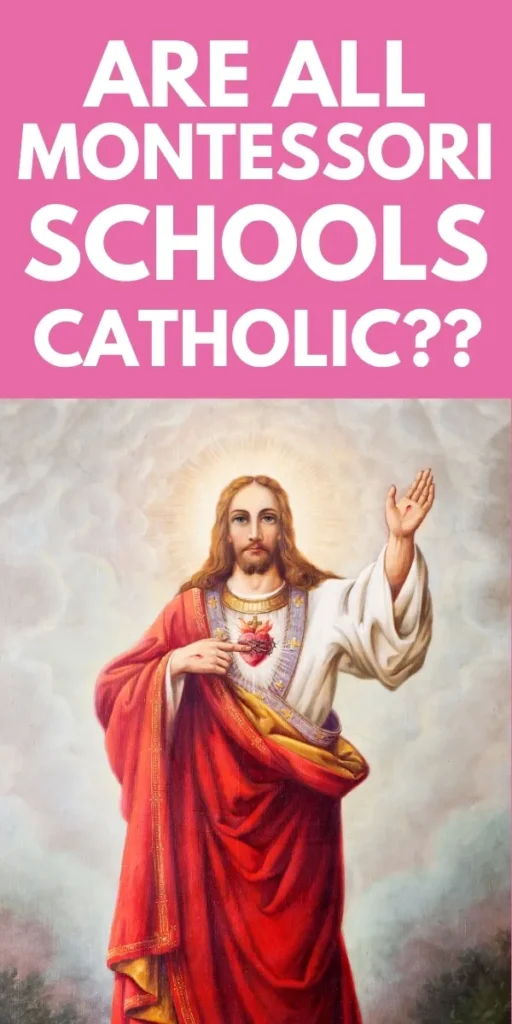As you explore the captivating world of Montessori education, a common question may arise: Are All Montessori schools Catholic?
The answer, like many things in life, isn’t straightforward.
Unraveling the complex tapestry of Montessori philosophy, its Catholic influences, and the diverse educational landscape it has woven calls for an in-depth exploration.
Are All Montessori Schools Catholic? – A Quick Answer
No, not all Montessori schools are Catholic. Montessori education is not inherently religious and does not provide any form of religious instruction.
However, some Montessori schools, especially those with a diverse student body, may organize cultural fairs and events to honor and explore each other’s heritage, including religious beliefs.
Montessori’s Foundations: Intertwined Roots of Education and Faith

Dr. Maria Montessori, the pioneering Italian physician and educator, developed her methodology in the early 20th century. Born into a devout Catholic family, her worldview was naturally influenced by her faith.
While not explicitly religious, Montessori believed in a universal “cosmic child” and an innate human spirit, concepts resonating with elements of Catholicism.
Influences of Catholic Thought:
- Emphasis on holistic development: Recognizing the human being as a physical, intellectual, and spiritual entity aligns with the Catholic value of integral human formation.
- Respect for individual dignity: Montessori’s focus on child-centered learning echoes the Christian concept of inherent human worth and respect for individual journeys.
- Importance of community: The collaborative, mixed-age environment in Montessori classrooms mirrors the concept of Christian community and collective responsibility.
However, it’s crucial to distinguish between these underlying philosophical echoes and any direct religious instruction. Montessori schools, by and large, do not promote any specific religion.
Their focus lies on fostering a love of learning, independent thinking, and personal growth within a nurturing environment.
Beyond the Binary: Montessori Schools in a Diverse World
Today, Montessori schools exist in a myriad of forms, reflecting the global reach and dynamism of its philosophy. While some Montessori schools may operate under the aegis of Catholic institutions, the vast majority are secular.
They cater to families of diverse religious backgrounds and prioritize inclusivity, welcoming children regardless of their faith.
Diversity of Montessori Schools:
- Independently operated: Many Montessori schools are privately owned and run by individuals or boards aligned with the Montessori philosophy.
- Public Montessori programs: Some public schools integrate Montessori principles into their curriculum, offering secular Montessori education within the public school system.
- Interfaith collaborations: Certain Montessori schools may operate in partnership with interfaith organizations, promoting respect for diverse religious beliefs.
Therefore, the assumption that “all Montessori schools are Catholic” paints an inaccurate picture.
The majority of Montessori schools are committed to providing a secular education while embracing the core principles of the Montessori philosophy.
Choosing the Right Fit: Aligning Montessori with Your Values

The decision to enroll your child in a Montessori school ultimately rests on finding the best fit for their individual needs and your family’s values. Factors to consider include:
- Child’s learning style: Does your child thrive in a self-directed environment or benefit from more structured teaching?
- Family priorities: Is fostering religious education important to you, or do you seek a secular learning environment?
- School ethos and philosophy: Align yourself with the specific values and approach of the individual Montessori school.
- Practical considerations: Location, cost, and availability of programs are also important factors to evaluate.
Remember, a genuine inquiry and open communication with the school administration can clarify their religious affiliation and educational approach.
Also Read:
- What Age Does Montessori End?
- Why Montessori is Bad?: A Quick Answer
- Montessori Vs Preschool: Which Is Better?
- Reggio Emilia Vs Montessori: Which Is Better?
Montessori: Cultivating Growth Beyond Labels
As you navigate the educational landscape, it’s important to move beyond labels and focus on the essence of Montessori education. Its core principles of fostering lifelong learning, independent thinking, and respect for all individuals transcend any specific religious affiliation.
At its heart, Montessori education offers a unique path to cultivate confident, self-aware individuals equipped with the skills and curiosity to explore the world and contribute meaningfully to it.
Whether housed in a secular or religious setting, this journey of self-discovery and intellectual growth remains the true compass of a Montessori education.
So, to answer the question definitively: no, all Montessori schools are not Catholic. The Montessori philosophy embraces diversity and welcomes children from all backgrounds, offering a vibrant and nurturing environment for exploration, regardless of faith.
